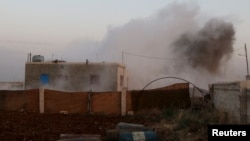The Syrian government is locked in a struggle with rebel militia groups in and around the country's largest city, Aleppo, in some of the most bitter fighting since the four-year-old uprising began in 2011. May was reportedly the bloodiest month since the conflict began, with over 6,000 people killed in fighting across the country.
Residents in the town of Tel Rifaat struggle to dig friends and neighbors from under the rubble after a Syrian government warplane dropped a barrel bomb over a block of flats. Intense government airstrikes were reported over the Aleppo region during the past 72 hours. Other strikes were reported over the rebel-held region of Idlib.
Amateur video also showed Syrian rebel fighters rushing men and armed pickup trucks to defend positions north of Aleppo from Islamic State militants who are attempting to encroach on their territory. IS controls several large suburbs of Aleppo, including Monbaj and al-Bab, and is reportedly trying to capture points along the Turkish border.
Al-Hayat newspaper, quoting the opposition Saraj Press Agency, reported that opposition fighters regained ground from IS militants trying to capture the Azouz border crossing. It said the fighting was accompanied by heavy shelling and intense barrages of Grad rockets.
The U.S. Embassy in Syria's official Twitter feed accused the Syrian government Tuesday of conducting airstrikes to help Islamic State militants capture territory near Aleppo. Syrian opposition leader Khaled Khoja accused the Syrian government Monday of helping IS gain ground around the oasis town of Palmyra.
The Turkish newspaper Cumhurriyet, however, accused the Turkish intelligence agency last week of sending arms to Islamic State militants in northern Syria. It posted photos of what it claimed was a shipment earlier this year. Refuting the charge, Turkish President Recep Tayyip Erdogan denied Tuesday that his country was helping IS.
Syrian state TV, meanwhile, reported that government warplanes bombed Islamic State militants at the Air Force Academy, near Aleppo, “destroying their armed vehicles.”
State TV also reported that Parliament Speaker Mohammed Jihad al-Laham met with Iranian officials Tuesday during a visit to Tehran to discuss the ongoing conflict. The TV report said that Tehran vowed to redouble its efforts to help Syria in the “battle against terrorists.”
Middle East analyst Nadim Shehadi, who heads the Fares Center at Tufts University's Fletcher School of Diplomacy, tod VOA that the conflict in northern Syria could continue to see-saw back and forth between the government and opposition fighters due to outside intervention from various regional players.
But, he stressed that the recent rebel successes in the Idlib region and near Aleppo were due to increased cooperation between Turkey, Qatar and Saudi Arabia in sending arms to the various rebel factions.
"There has been change - principally on the military level - in the past month and this is because the [opposition] Jeish al-Fatah has been receiving a lot of arms. The new factor is a Qatari-Saudi-Turkish rapprochement, which has given a boost to the opposition and making it gain some ground," said Shehadi.
Joshua Landis, who heads the Center for Middle East Studies at the University of Oklahoma, noted that rebel infighting has intensified as opposing factions vie for control of Aleppo. “An unstated truce,” he said, “between the Jabhat al-Nusra, the Free Syrian Army and [Islamic State] that has held for almost a year is now breaking down.”
“It would make more sense,” he said, “for Jabhat al-Nusra and Islamic State to cooperate and go after Damascus, the seat of [President Bashar al-] Assad's power, but the temptations of Aleppo are too strong.” “For this reason,” he argues, “the Assad regime may survive more years.”




